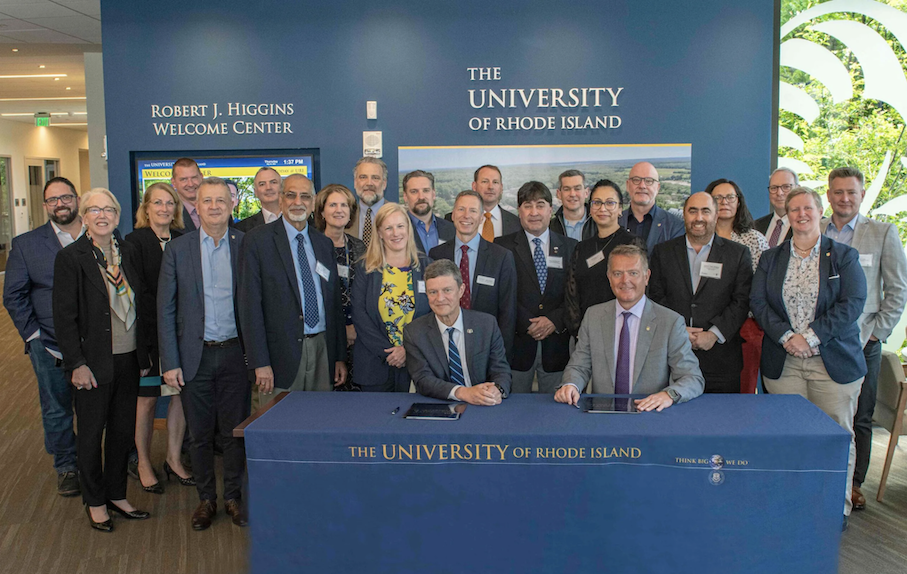
The University of Rhode Island and Flinders University have formalised a research and education partnership that advances AUKUS, a security partnership signed by the governments of the United States, Australia, and the United Kingdom.
URI’s agreement with Flinders will bolster Australia’s efforts to produce the skilled workforce needed to deliver on the AUKUS security pact, which includes a phased approach to build Australia’s undersea capability through the acquisition of conventionally armed, nuclear-powered submarines.
“The University of Rhode Island is known for its global engagement and its enduring legacy of service to the state, nation, and world,” said University of Rhode Island President Professor Marc Parlange.
“Our researchers are committed to addressing the most pressing issues facing our global community. This research partnership with Flinders University will advance our strategic priorities to collaborate globally; create connecting points for communities, companies, and government agencies; and drive innovation that has a meaningful impact on society.”
The agreement, signed by Professor Parlange and Flinders University President and Vice Chancellor Professor Colin Stirling, positions URI as the United States’ university leader in support of AUKUS and opens the door for collaborative research and education programs, information sharing, relationship building with government and industry, as well as the potential for joint events and workshops—all intended to drive innovation in support of AUKUS.
“The AUKUS nuclear-powered submarine program is an unparalleled advanced manufacturing opportunity that will be Australia’s biggest defence investment,” said Professor Stirling.
“Flinders University is internationally recognized as a leader in advanced manufacturing capability at our innovation campus at Tonsley in Adelaide, South Australia—home to the world’s first fully integrated Factory of the Future and Technical College. Our historic partnership with the University of Rhode Island complements our strengths in modern manufacturing and brings some of the world’s best nuclear education and research programs to Australia.
“Flinders looks forward to working with the University of Rhode Island and our UK partner, the University of Manchester, to create a nuclear research and education network that supports our nations,” Professor Stirling said.
The agreement between the two universities is the culmination of a two-day visit during which representatives from Flinders toured URI’s Kingston and Narragansett Bay campuses and met with URI faculty members and researchers, as well as representatives from the U.S. Navy, and URI partners at MITRE and MIT’s Lincoln Laboratory, to discuss upcoming opportunities for collaboration.
“This is a big part of continuing to make sure the AUKUS agreement has a legacy that endures. If you build the research base and the student workforce flowing in from all countries, it will become self-sustaining. By building that relationship and that workforce exchange now, at the early research stage, we can ensure we have the technology development base to support those submarines over their lifetime, into the next century,” said Jason Gomez, chief technology officer, Naval Undersea Warfare Center Division Newport.
“Newport has a long history working with the University of Rhode Island and with Australia, so to be able to expand our research base to universities in Australia is a benefit for the whole community.”
Jay Lustig, multi-domain business operations manager at MITRE, added, “MITRE has made a commitment to Australia and has opened a new facility there. We have a longstanding relationship with the University of Rhode Island and are looking forward to building one with Flinders, so seeing this relationship between the two universities recemented is really fabulous. We look forward to working together with the entire coalition to strengthen the industrial base both here and in Australia and to expand capabilities into the future.”
URI is known globally for its strength in oceanography and ocean engineering, which includes notable defense-focused university-industry partnerships and a collaboration with the U.S. Navy. It is home to 401 Tech Bridge, an economic development program that connects manufacturers, small businesses, research and development entities, trade organizations and state and defense agencies to collaborate in the development of new advanced materials, technologies, and products.
URI is also home to the National Institute for Undersea Vehicle Technologies, a university-industry partnership in collaboration with the University of Connecticut and the U.S. Navy to advance the capabilities of the next generation U.S. undersea fleet through innovative workforce training and by accelerating the research, development, and transition of key enabling technologies. In addition, URI hosts the Rhode Island Nuclear Science Center and the University’s Bay Campus is home to one of only 25 university-based nuclear reactors in the United States.
Flinders University is a leading international university in Australia with a record of excellence and innovation in teaching and research, supporting a long history of collaboration with defence and industry. Its noted capability in the defence sphere spans maritime engineering, digital engineering, mechanical engineering, nanotechnology, robotics, cyber defense and electronic warfare, and reskilling.
As the Southern Hemisphere’s hub in a global innovation ecosystem, Flinders University is home to the Factory of the Future advanced manufacturing research and test facility developed in collaboration with BAE Systems Maritime Australia and the South Australian and Australian governments.
The memorandum of understanding coincides with an agreement between Flinders and the University of Manchester, the lead university in the UK’s Nuclear Technology Education Consortium, which will deliver its nuclear master’s and doctoral-level research training in South Australia to build capacity to meet industry needs.

